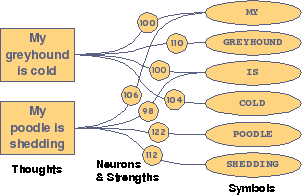
Mindmeld is made up primarily of

What happens when you submit "My dog is cold" to Mindmeld?
First, Mindmeld breaks the question into search symbols, or stimuli.
Next, Mindmeld identifies each symbol in its database that matches
one of the stimuli, and lists the neurons linking those symbols to thoughts. For every thought returned, the strength of its neurons that took part in the search is summed, resulting in the final weight of that thought. You are presented with a list of the top
thoughts that matched your search, sorted by weight.

Finally, you view the answer and provide feedback. Here's what
happens when you click the "YES" (this answer was helpful) button:
| Strengthened neurons for this thought: | MY | IS | COLD |
|---|
| Weakened neurons for this thought: | GREYHOUND |
|---|
| Weakened neurons for other thoughts: | MY | IS |
|---|
| New Symbols added and linked to this thought: | DOG |
|---|

But what happens when you select the "NO" (this answer wasn't helpful) button?
| Weakened neurons for this thought: | MY | IS | COLD |
|---|
First of all, it means Mindmeld can learn new words and relate them to answers dynamically. Further, it can determine the importance of a given word with respect to a specific answer. It adapts. It is Borg.
Over time, Mindmeld can identify common synonyms and mispellings automatically. This follows from the previous point; if you misspell a word, but eventually get to the right answer, Mindmeld will add the misspelled word as a symbol.
Frequently-used answers bubble to the top, infrequently-used answers require more specific searches to find. Just like your own memory.
What about "MY" and "HOW DO I" and all those other generally meaningless words that are getting strengthened during the searches?
Mindmeld uses basic statistical analysis to identify words that occur so frequently as to be meaningless in a search. Words such as "A," "MY," etc., exist as symbols, but are generally ignored during a search. Note: The noise filter will not begin marking noisewords until there's enough data (from answers and searches) in your knowledgebase to be statistically significant.